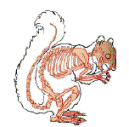
Almira Sessions (left) and Mary Beth Hughes in The Ox-Bow Incident (dir. William A. Wellman, 1942).
The Ox-Bow Incident is a short film (75 minutes) with a spare, streamlined plot consisting in a few rudimentary actions: a rancher is reported murdered; a lynch mob forms despite the protests of a small handful of reasonable men; three suspects are found and hanged; it is revealed that the suspects were innocent. A familiar enough morality play, and very affecting. What makes the whole thing feel like much more than the sum of its parts, however, is its unusual density of backstory, a backstory that is never fully elaborated, only meted out in brief, elliptical mini-arcs. Henry Fonda's character is essentially a bystander throughout; it's the tangential information about his past, as spare as that information is, which makes it seem natural that he gets top billing. The woman in his life, played by Mary Beth Hughes, appears for less than five minutes in the middle of the film, and she has nothing to do with the main plot, but she manages to make the weight of her appearance felt as somehow central: she rides in and out on a stagecoach, as though dropping in for a visit from another film in which she is the star. Anthony Quinn's character, similarly, is a story all on his own, albeit a story told only in shadowy fragments. Based on the amount of actual information given about them, virtually all the characters in the film are "flat," but even the most minor supporting characters somehow come off as somewhat "round." The movie is a small masterpiece of tip-of-the-iceberg storytelling.



